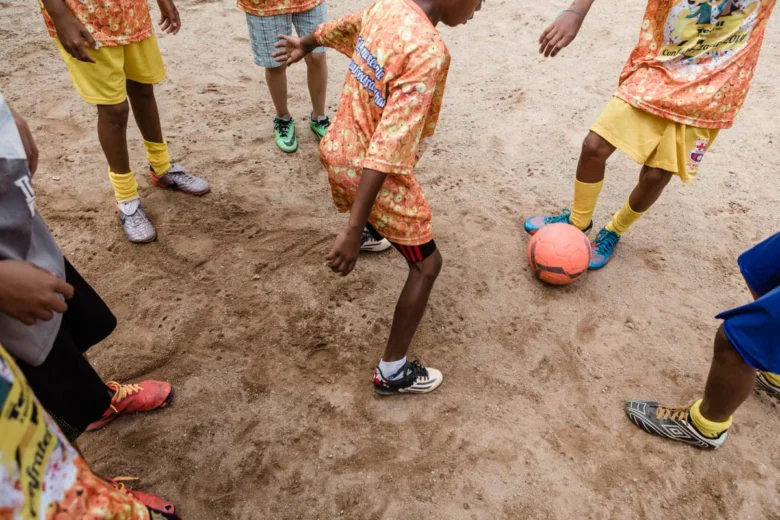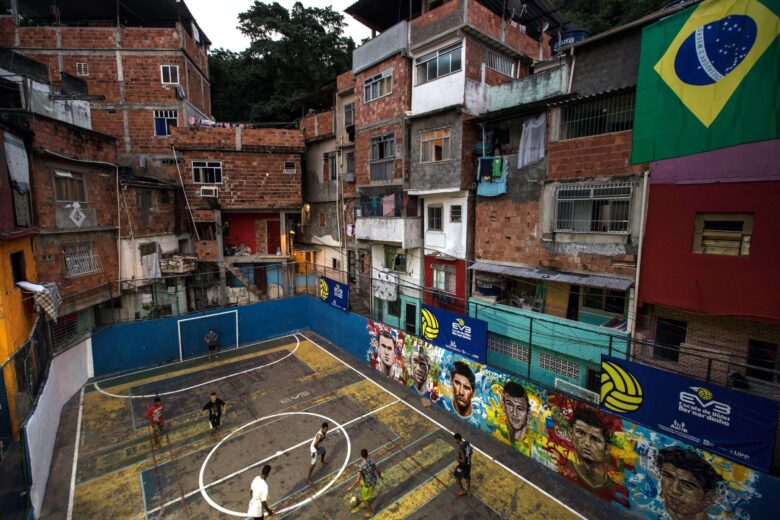Street soccer is a form of soccer played in the streets, often with improvised equipment and unique rules. Street soccer holds a greater significance than just being a sport, as it is deeply ingrained in the way of life and serves as a means of fostering a sense of togetherness and inclusion among numerous youngsters. If you’re a soccer fan and enjoy playing bets, make sure to check out TonyBet WebSite.
Contents
The Origins of Street Soccer in Brazil
The origins of street soccer in Brazil can be traced back to the early 20th century when soccer first arrived in the country. The sport quickly became popular, but many Brazilians didn’t have access to traditional soccer facilities. As a result, they started playing soccer in the streets, using whatever objects they could find as makeshift goals. This form of soccer soon developed its unique style, characterized by quick footwork, improvisation, and creativity. Street soccer became a way for young Brazilians to express themselves and showcase their skills, and it has since become an important part of Brazilian culture and the country’s rich soccer history.

Source: aljazeera.com
Rules of The Game
Street soccer is typically played with fewer players and on smaller fields, making it more fast-paced and dynamic. The ball used in this game is often smaller and heavier than a traditional soccer ball, which requires players to have better ball control and technique. Street soccer also emphasizes creativity, with players encouraged to try out new moves and tricks during the game. These unique rules and elements of street soccer have helped to shape the style of play in Brazil and have produced some of the most skilled and creative soccer players in the world.
Famous Brazilian Street Soccer Players
Some notable players include Ronaldinho, who is widely considered one of the greatest players of all time, and Neymar, who is known for his dazzling skills and trickery on the field. Both players grew up playing street soccer and credit this style of play with helping them develop their unique skills and creativity. Other famous Brazilian street soccer players include Ronaldo, Robinho, and Cafu. These players have had a promising impact on the game of soccer and continue to inspire young players in Brazil and around the world.

Source: independent.co.uk
Street Soccer Competitions in Brazil
Street soccer competitions in Brazil are some of the most popular and exciting events in the country. The Red Bull Street Style competition is one of the biggest, featuring freestyle soccer battles between the world’s top players. This event draws large crowds and showcases some of the most impressive street soccer skills in the world. Other street soccer competitions in Brazil include the Street Soccer World Cup and the Brazilian Street Soccer Championship. These events provide a platform for street soccer players to showcase their talents and compete against other skilled players from around the world, making them a major part of Brazil’s vibrant soccer culture.
In addition to the major soccer competitions in Brazil, there are also many local and regional tournaments that take place throughout the country. These events provide an opportunity for amateur players to showcase their skills and compete against other teams in their area. The Copa dos Refugiados (Refugee Cup) is a notable example of a grassroots street soccer competition that aims to promote social integration and community building through the sport.
What makes these competitions in Brazil so unique is the passion and energy that players and fans bring to the game. Thisvis a highly competitive and skill-based sport, with players performing incredible feats of agility, speed, and ball control. Fans of street soccer in Brazil are known for their loud and boisterous support of their favorite players and teams, creating a lively and festive atmosphere at these events.
The Cultural Significance of Street Soccer in Brazil
In Brazil, street soccer is not just a sport, but a way of life, bringing communities together and providing a sense of belonging for many young people. It is also a symbol of Brazil’s creativity, resilience, and passion for the game of soccer. Street soccer players are often seen as local heroes, admired for their skill and dedication to the sport.
The game is also a reflection of Brazil’s diverse cultural heritage. It combines elements of African, Indigenous, and European cultures, resulting in a unique and dynamic playing style that is recognized worldwide. The rhythm, flair, and improvisation that characterize Brazilian soccer are all rooted in the game’s street origins.

Source: pinterest.com
Street Soccer and Social Inclusion
The appeal of the sport lies in its accessibility, as it enables players to cultivate their abilities and love for the game without necessitating costly gear or infrastructure, given that it can be played in any location. It also provides a sense of community and belonging for these players, helping them to build relationships and connect with others who share their interests. By promoting social inclusion and providing opportunities for young people, street soccer is helping to shape a more equitable and inclusive society in Brazil.
For many young people in Brazil, it provides an outlet for self-expression and creativity, as well as an opportunity to develop their skills and love for the game. Whether playing with friends in a local park or participating in organized tournaments, this game enables players to connect with others who share their passion for the sport, creating a sense of community and belonging.
The game’s focus on inclusion and social integration is particularly important in a country like Brazil, where social and economic inequalities are significant challenges. By providing opportunities for young people to participate in the sport, regardless of their background or socioeconomic status, street soccer is helping to build more equitable and inclusive communities.
Moreover, it has the potential to promote positive values and behaviors, such as teamwork, fair play, and respect. These values are essential for building strong communities and fostering a sense of social responsibility among young people.
Street soccer has evolved from being a version of soccer played on the streets to becoming a well-liked sport that promotes social inclusion. It has had a significant influence on Brazil’s distinct style of play and has produced numerous renowned soccer players. Street soccer is a representation of resourcefulness, determination, and enthusiasm and will remain a source of pride and inspiration for Brazilians in the future.
